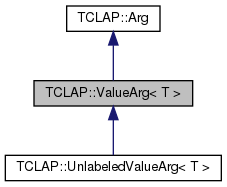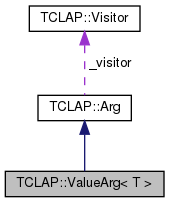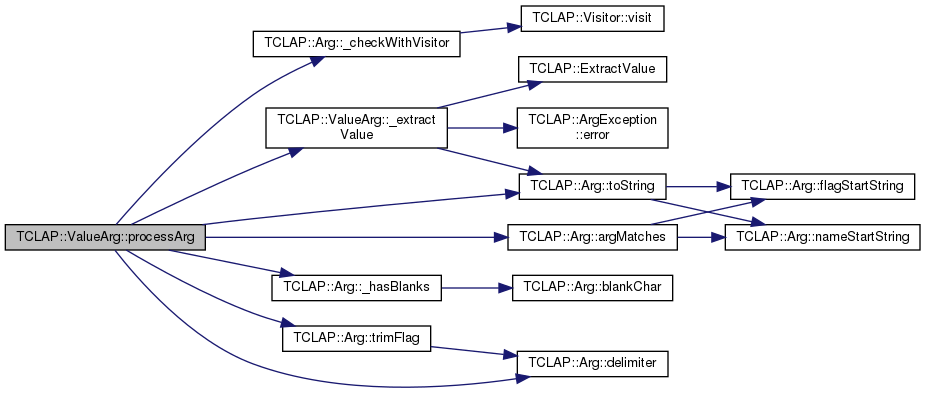The basic labeled argument that parses a value. More...
#include <ValueArg.h>


Public Member Functions | |
| ValueArg (const std::string &flag, const std::string &name, const std::string &desc, bool req, T value, const std::string &typeDesc, Visitor *v=NULL) | |
| Labeled ValueArg constructor. More... | |
| ValueArg (const std::string &flag, const std::string &name, const std::string &desc, bool req, T value, const std::string &typeDesc, ArgContainer &parser, Visitor *v=NULL) | |
| Labeled ValueArg constructor. More... | |
| ValueArg (const std::string &flag, const std::string &name, const std::string &desc, bool req, T value, Constraint< T > *constraint, ArgContainer &parser, Visitor *v=NULL) | |
| Labeled ValueArg constructor. More... | |
| ValueArg (const std::string &flag, const std::string &name, const std::string &desc, bool req, T value, Constraint< T > *constraint, Visitor *v=NULL) | |
| Labeled ValueArg constructor. More... | |
| virtual bool | processArg (int *i, std::vector< std::string > &args) |
| Handles the processing of the argument. More... | |
| const T & | getValue () const |
| Returns the value of the argument. More... | |
| operator const T & () const | |
| A ValueArg can be used as as its value type (T) This is the same as calling getValue() More... | |
| virtual std::string | shortID (const std::string &val="val") const |
| Specialization of shortID. More... | |
| virtual std::string | longID (const std::string &val="val") const |
| Specialization of longID. More... | |
| virtual void | reset () |
| Clears the Arg object and allows it to be reused by new command lines. More... | |
 Public Member Functions inherited from TCLAP::Arg Public Member Functions inherited from TCLAP::Arg | |
| virtual | ~Arg () |
| Destructor. More... | |
| virtual void | addToList (std::list< Arg *> &argList) const |
| Adds this to the specified list of Args. More... | |
| virtual bool | operator== (const Arg &a) const |
| Operator ==. More... | |
| const std::string & | getFlag () const |
| Returns the argument flag. More... | |
| const std::string & | getName () const |
| Returns the argument name. More... | |
| std::string | getDescription () const |
| Returns the argument description. More... | |
| std::string | getDescription (bool required) const |
| Returns the argument description. More... | |
| virtual bool | isRequired () const |
| Indicates whether the argument is required. More... | |
| bool | isValueRequired () const |
| Indicates whether a value must be specified for argument. More... | |
| bool | isSet () const |
| Indicates whether the argument has already been set. More... | |
| const std::string & | setBy () const |
| Returns the value specified to set this flag (like -a or –all). More... | |
| bool | isIgnoreable () const |
| Indicates whether the argument can be ignored, if desired. More... | |
| virtual bool | argMatches (const std::string &s) const |
| A method that tests whether a string matches this argument. More... | |
| virtual std::string | toString () const |
| Returns a simple string representation of the argument. More... | |
| virtual void | trimFlag (std::string &flag, std::string &value) const |
| Trims a value off of the flag. More... | |
| bool | _hasBlanks (const std::string &s) const |
| Checks whether a given string has blank chars, indicating that it is a combined SwitchArg. More... | |
| virtual bool | allowMore () |
| Used for MultiArgs to determine whether args can still be set. More... | |
| virtual bool | acceptsMultipleValues () |
| Use by output classes to determine whether an Arg accepts multiple values. More... | |
| virtual void | hideFromHelp (bool hide=true) |
| Hide this argument from the help output (e.g., when specifying the –help flag or on error. More... | |
| virtual bool | visibleInHelp () const |
| Returns true if this Arg is visible in the help output. More... | |
| virtual bool | hasLabel () const |
Protected Member Functions | |
| void | _extractValue (const std::string &val) |
| Extracts the value from the string. More... | |
 Protected Member Functions inherited from TCLAP::Arg Protected Member Functions inherited from TCLAP::Arg | |
| void | _checkWithVisitor () const |
| Performs the special handling described by the Visitor. More... | |
| Arg (const std::string &flag, const std::string &name, const std::string &desc, bool req, bool valreq, Visitor *v=NULL) | |
| Primary constructor. More... | |
Protected Attributes | |
| T | _value |
| The value parsed from the command line. More... | |
| T | _default |
| Used to support the reset() method so that ValueArg can be reset to their constructed value. More... | |
| std::string | _typeDesc |
| A human readable description of the type to be parsed. More... | |
| Constraint< T > * | _constraint |
| A Constraint this Arg must conform to. More... | |
 Protected Attributes inherited from TCLAP::Arg Protected Attributes inherited from TCLAP::Arg | |
| std::string | _flag |
| The single char flag used to identify the argument. More... | |
| std::string | _name |
| A single word namd identifying the argument. More... | |
| std::string | _description |
| Description of the argument. More... | |
| const bool | _required |
| Indicating whether the argument is required. More... | |
| std::string | _requireLabel |
| Label to be used in usage description. More... | |
| bool | _valueRequired |
| Indicates whether a value is required for the argument. More... | |
| bool | _alreadySet |
| Indicates whether the argument has been set. More... | |
| std::string | _setBy |
| Indicates the value specified to set this flag (like -a or –all). More... | |
| Visitor * | _visitor |
| A pointer to a visitor object. More... | |
| bool | _ignoreable |
| Whether this argument can be ignored, if desired. More... | |
| bool | _acceptsMultipleValues |
| bool | _visibleInHelp |
| Indicates if the argument is visible in the help output (e.g., when specifying –help). More... | |
Additional Inherited Members | |
 Static Public Member Functions inherited from TCLAP::Arg Static Public Member Functions inherited from TCLAP::Arg | |
| static char | delimiter () |
| The delimiter that separates an argument flag/name from the value. More... | |
| static char | blankChar () |
| The char used as a place holder when SwitchArgs are combined. More... | |
| static char | flagStartChar () |
| static const std::string | flagStartString () |
| static const std::string | nameStartString () |
| static const std::string | ignoreNameString () |
| The name used to identify the ignore rest argument. More... | |
| static void | setDelimiter (char c) |
| Sets the delimiter for all arguments. More... | |
Detailed Description
template<class T>
class TCLAP::ValueArg< T >
The basic labeled argument that parses a value.
This is a template class, which means the type T defines the type that a given object will attempt to parse when the flag/name is matched on the command line. While there is nothing stopping you from creating an unflagged ValueArg, it is unwise and would cause significant problems. Instead use an UnlabeledValueArg.
Definition at line 45 of file ValueArg.h.
Constructor & Destructor Documentation
◆ ValueArg() [1/4]
| TCLAP::ValueArg< T >::ValueArg | ( | const std::string & | flag, |
| const std::string & | name, | ||
| const std::string & | desc, | ||
| bool | req, | ||
| T | value, | ||
| const std::string & | typeDesc, | ||
| Visitor * | v = NULL |
||
| ) |
Labeled ValueArg constructor.
Constructor implementation.
You could conceivably call this constructor with a blank flag, but that would make you a bad person. It would also cause an exception to be thrown. If you want an unlabeled argument, use the other constructor.
- Parameters
-
flag - The one character flag that identifies this argument on the command line. name - A one word name for the argument. Can be used as a long flag on the command line. desc - A description of what the argument is for or does. req - Whether the argument is required on the command line. value - The default value assigned to this argument if it is not present on the command line. typeDesc - A short, human readable description of the type that this object expects. This is used in the generation of the USAGE statement. The goal is to be helpful to the end user of the program. v - An optional visitor. You probably should not use this unless you have a very good reason.
Definition at line 239 of file ValueArg.h.
◆ ValueArg() [2/4]
| TCLAP::ValueArg< T >::ValueArg | ( | const std::string & | flag, |
| const std::string & | name, | ||
| const std::string & | desc, | ||
| bool | req, | ||
| T | value, | ||
| const std::string & | typeDesc, | ||
| ArgContainer & | parser, | ||
| Visitor * | v = NULL |
||
| ) |
Labeled ValueArg constructor.
You could conceivably call this constructor with a blank flag, but that would make you a bad person. It would also cause an exception to be thrown. If you want an unlabeled argument, use the other constructor.
- Parameters
-
flag - The one character flag that identifies this argument on the command line. name - A one word name for the argument. Can be used as a long flag on the command line. desc - A description of what the argument is for or does. req - Whether the argument is required on the command line. value - The default value assigned to this argument if it is not present on the command line. typeDesc - A short, human readable description of the type that this object expects. This is used in the generation of the USAGE statement. The goal is to be helpful to the end user of the program. parser - A CmdLine parser object to add this Arg to v - An optional visitor. You probably should not use this unless you have a very good reason.
Definition at line 249 of file ValueArg.h.
References TCLAP::ArgContainer::add().

◆ ValueArg() [3/4]
| TCLAP::ValueArg< T >::ValueArg | ( | const std::string & | flag, |
| const std::string & | name, | ||
| const std::string & | desc, | ||
| bool | req, | ||
| T | value, | ||
| Constraint< T > * | constraint, | ||
| ArgContainer & | parser, | ||
| Visitor * | v = NULL |
||
| ) |
Labeled ValueArg constructor.
You could conceivably call this constructor with a blank flag, but that would make you a bad person. It would also cause an exception to be thrown. If you want an unlabeled argument, use the other constructor.
- Parameters
-
flag - The one character flag that identifies this argument on the command line. name - A one word name for the argument. Can be used as a long flag on the command line. desc - A description of what the argument is for or does. req - Whether the argument is required on the command line. value - The default value assigned to this argument if it is not present on the command line. constraint - A pointer to a Constraint object used to constrain this Arg. parser - A CmdLine parser object to add this Arg to. v - An optional visitor. You probably should not use this unless you have a very good reason.
Definition at line 272 of file ValueArg.h.
References TCLAP::ArgContainer::add().

◆ ValueArg() [4/4]
| TCLAP::ValueArg< T >::ValueArg | ( | const std::string & | flag, |
| const std::string & | name, | ||
| const std::string & | desc, | ||
| bool | req, | ||
| T | value, | ||
| Constraint< T > * | constraint, | ||
| Visitor * | v = NULL |
||
| ) |
Labeled ValueArg constructor.
You could conceivably call this constructor with a blank flag, but that would make you a bad person. It would also cause an exception to be thrown. If you want an unlabeled argument, use the other constructor.
- Parameters
-
flag - The one character flag that identifies this argument on the command line. name - A one word name for the argument. Can be used as a long flag on the command line. desc - A description of what the argument is for or does. req - Whether the argument is required on the command line. value - The default value assigned to this argument if it is not present on the command line. constraint - A pointer to a Constraint object used to constrain this Arg. v - An optional visitor. You probably should not use this unless you have a very good reason.
Definition at line 262 of file ValueArg.h.
Member Function Documentation
◆ _extractValue()
|
protected |
Extracts the value from the string.
Attempts to parse string as type T, if this fails an exception is thrown.
- Parameters
-
val - value to be parsed.
Definition at line 342 of file ValueArg.h.
References TCLAP::ValueArg< T >::_constraint, TCLAP::ValueArg< T >::_value, TCLAP::ArgException::error(), TCLAP::ExtractValue(), and TCLAP::Arg::toString().
Referenced by TCLAP::UnlabeledValueArg< T >::processArg(), and TCLAP::ValueArg< T >::processArg().

◆ getValue()
|
inline |
Returns the value of the argument.
Definition at line 205 of file ValueArg.h.
References TCLAP::ValueArg< T >::_value.
Referenced by TCLAP::ValueArg< T >::operator const T &().
◆ longID()
|
virtual |
Specialization of longID.
Implementation of longID.
- Parameters
-
val - value to be used.
Reimplemented from TCLAP::Arg.
Reimplemented in TCLAP::UnlabeledValueArg< T >.
Definition at line 337 of file ValueArg.h.
References TCLAP::ValueArg< T >::_typeDesc, and TCLAP::Arg::longID().
Referenced by TCLAP::ValueArg< T >::operator const T &().

◆ operator const T &()
|
inline |
A ValueArg can be used as as its value type (T) This is the same as calling getValue()
Definition at line 211 of file ValueArg.h.
References TCLAP::ValueArg< T >::getValue(), TCLAP::ValueArg< T >::longID(), TCLAP::ValueArg< T >::reset(), and TCLAP::ValueArg< T >::shortID().

◆ processArg()
|
virtual |
Handles the processing of the argument.
Implementation of processArg().
This re-implements the Arg version of this method to set the _value of the argument appropriately. It knows the difference between labeled and unlabeled.
- Parameters
-
i - Pointer the the current argument in the list. args - Mutable list of strings. Passed in from main().
Implements TCLAP::Arg.
Reimplemented in TCLAP::UnlabeledValueArg< T >.
Definition at line 288 of file ValueArg.h.
References TCLAP::Arg::_alreadySet, TCLAP::Arg::_checkWithVisitor(), TCLAP::ValueArg< T >::_extractValue(), TCLAP::Arg::_hasBlanks(), TCLAP::Arg::_setBy, TCLAP::Arg::argMatches(), TCLAP::Arg::delimiter(), TCLAP::Arg::toString(), and TCLAP::Arg::trimFlag().

◆ reset()
|
virtual |
Clears the Arg object and allows it to be reused by new command lines.
Reimplemented from TCLAP::Arg.
Definition at line 358 of file ValueArg.h.
References TCLAP::ValueArg< T >::_default, TCLAP::ValueArg< T >::_value, and TCLAP::Arg::reset().
Referenced by TCLAP::ValueArg< T >::operator const T &().

◆ shortID()
|
virtual |
Specialization of shortID.
Implementation of shortID.
- Parameters
-
val - value to be used.
Reimplemented from TCLAP::Arg.
Reimplemented in TCLAP::UnlabeledValueArg< T >.
Definition at line 329 of file ValueArg.h.
References TCLAP::ValueArg< T >::_typeDesc, and TCLAP::Arg::shortID().
Referenced by TCLAP::ValueArg< T >::operator const T &().

Member Data Documentation
◆ _constraint
|
protected |
A Constraint this Arg must conform to.
Definition at line 72 of file ValueArg.h.
Referenced by TCLAP::ValueArg< T >::_extractValue().
◆ _default
|
protected |
Used to support the reset() method so that ValueArg can be reset to their constructed value.
Definition at line 58 of file ValueArg.h.
Referenced by TCLAP::ValueArg< T >::reset().
◆ _typeDesc
|
protected |
A human readable description of the type to be parsed.
This is a hack, plain and simple. Ideally we would use RTTI to return the name of type T, but until there is some sort of consistent support for human readable names, we are left to our own devices.
Definition at line 67 of file ValueArg.h.
Referenced by TCLAP::UnlabeledValueArg< T >::longID(), TCLAP::ValueArg< T >::longID(), and TCLAP::ValueArg< T >::shortID().
◆ _value
|
protected |
The value parsed from the command line.
Can be of any type, as long as the >> operator for the type is defined.
Definition at line 52 of file ValueArg.h.
Referenced by TCLAP::ValueArg< T >::_extractValue(), TCLAP::ValueArg< T >::getValue(), and TCLAP::ValueArg< T >::reset().
The documentation for this class was generated from the following file:
 1.8.13
1.8.13